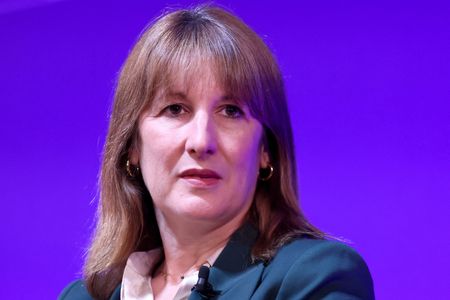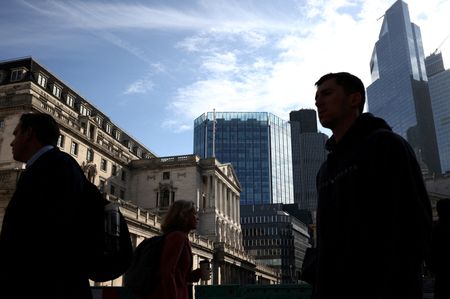LIVERPOOL, England (Reuters) -British finance minister Rachel Reeves will vow on Monday to guarantee that unemployed young people find work as she seeks positive headlines to boost Labour’s ratings while preparing a November budget where she may feel obliged to raise taxes.
After a first year in power marred by missteps and resignations, Labour trails the populist Reform UK party in surveys, and is under pressure to improve living standards without breaking its self-imposed fiscal discipline.
On Monday, Reeves will announce that every young person who receives Universal Credit benefit payments for 18 months without “earning or learning” will be guaranteed an offer of paid work, although it was not immediately clear what work this would be.
“I can commit this government to nothing less than the abolition of long-term youth unemployment,” Reeves will tell Labour’s annual conference, according to advance extracts of her speech.
Lawmakers on Labour’s left are pressing Reeves to find money for measures such as tackling child poverty, but she has vowed to stick to a pledge to balance the day-to-day budget by 2029, wary of putting large investors off buying or holding UK debt.
Some Labour lawmakers want to end a cap that limits child benefits to two children only, which would cost some 3.5 billion pounds ($4.7 billion) a year. Starmer has already reversed cuts to disability support and fuel subsidies that would have saved about 6 billion pounds a year.
In her first budget, less than a year ago, Reeves announced the biggest tax increases in 30 years. But more rises – possibly almost as big – are expected in her next one on November 26, worrying employers, who fear they might be on the hook again.
Government borrowing costs are already elevated; the 30-year UK gilt yield hit its highest since 1998 in early September.
Despite having the fastest growth in the Group of Seven countries in the first half, Britain’s economy is forecast to expand by less than 1.5% in 2025, and inflation looks likely to hit 4% in September, double the Bank of England’s target. ($1 = 0.7463 pounds)
(Reporting by Alistair Smout, additional reporting by William Schomberg; Editing by Kevin Liffey)










